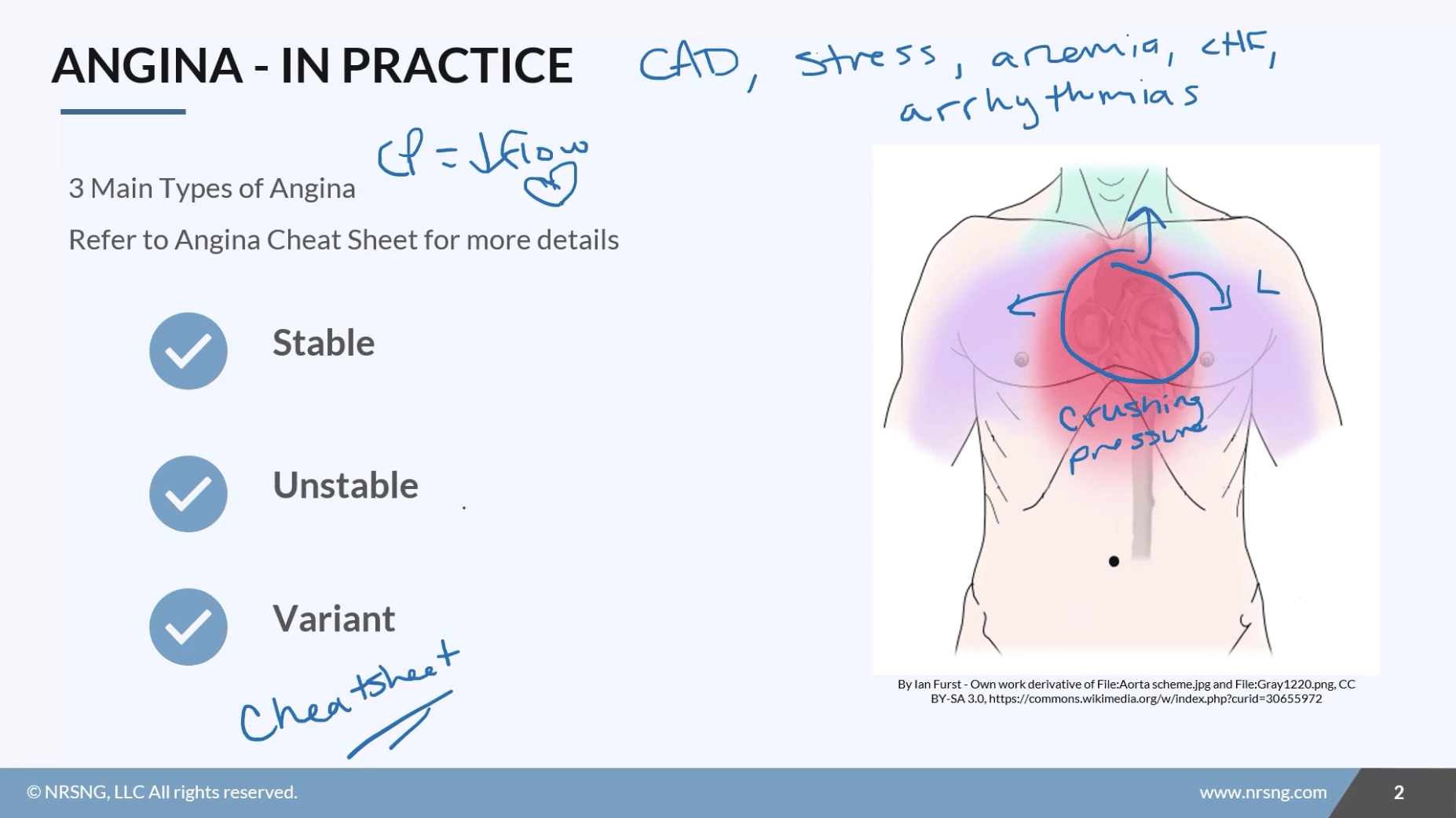FREE ANGINA NCLEX® PRACTICE QUESTIONS
NCLEX Questions On Angina and the Cardiovascular System as a whole, Can Be Very Challenging To Answer . . .
...because they include elements like
√ Heart Diagrams
√ Stable Angina
√ Unstable Angina
√ Chest Pain
√ Pathophysiology of Angina
√ Hypertension
√ Causes of Angina
√ Heart Function
√ Myocardial Infarction (MI)
√ and more...

5 Tips For Answering Angina (Cardiac) NCLEX Questions
- Read the Nclex Practice Questions Carefully:
- Always start by carefully reading the question and all the answer choices. Pay close attention to any keywords related to angina, such as "chest pain," as these are often critical to understanding the scenario presented.
Rationale: Understanding the context is the first step in selecting the correct answer. Missing a crucial detail can lead to choosing the wrong option.
- Assess the Patient's Condition:
- Before selecting an answer, mentally assess the patient's condition. Consider the severity of angina, any associated symptoms, and the patient's risk factors. Is the angina stable or unstable? Is it related to effort or at rest?
Rationale: A thorough assessment allows you to make an informed choice based on the patient's specific situation.
- Prioritize Safety and Immediate Needs:
- In angina-related questions, prioritize the patient's safety and immediate needs. Options that address alleviating chest pain, ensuring oxygenation, and promoting cardiovascular stability should be considered first.
Rationale: The NCLEX often emphasizes prioritizing interventions that address life-threatening situations or immediate discomfort.
- Consider Holistic Care:
- Remember that nursing care isn't just about medical interventions. Consider the patient's emotional and psychosocial needs as well. Options that address patient education, emotional support, and pain management may also be appropriate.
Rationale: Nursing care encompasses a holistic approach, and the NCLEX assesses your ability to consider the patient's overall well-being.
- Eliminate Incorrect Options:
- If you're unsure about the correct answer, start by eliminating obviously incorrect options. Cross out choices that are unrelated to the angina or that would worsen the patient's condition. This narrows down your choices and increases your chances of selecting the correct answer.
Rationale: The process of elimination can be a powerful tool in NCLEX questions, helping you focus on the most appropriate options.

Apply Critical Thinking
As you embark on your journey of preparing for the NCLEX, you'll likely encounter a variety of questions, including those related to angina. At first, these angina NCLEX questions might seem daunting, but as you gain experience and knowledge, you might come to not only handle them with ease but even find enjoyment in unraveling the complexities of cardiac health.
Picture this: a patient presents with chest pain, and you, armed with your growing expertise, swiftly assess the situation, recognizing the potential signs of angina. It's like putting together pieces of a puzzle, and with each question you conquer, you're getting closer to mastering this vital aspect of nursing care.
What makes angina questions intriguing is that they offer a window into the intricate world of the heart—an organ that's nothing short of amazing. Think about it; the heart tirelessly pumps blood throughout your entire body, ensuring that every tissue and organ receives the oxygen and nutrients it needs to function optimally. This deep understanding of how the heart functions within the body is not just about acing your exams; it's about arming yourself with a profound knowledge that will guide you throughout your nursing practice.
The heart isn't just a pump; it's a lifeline. It plays a central role in countless disease processes, from the well-known cardiovascular diseases like angina and heart attacks to conditions you'll encounter across various specialties. Whether you're in the emergency room, intensive care unit, or a general ward, having a strong grasp of cardiac health is a game-changer.
So, as you tackle those angina NCLEX questions, remember that you're not just preparing for an exam; you're equipping yourself with the skills and knowledge that will make you an effective and compassionate nurse. The journey may have its challenges, but with each question you answer correctly, you're taking a step closer to becoming a healthcare professional who truly makes a difference in the lives of your patients. Embrace the learning process, and let your passion for understanding the heart's mysteries drive you forward in your nursing education.